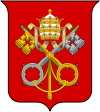- Congregation for the Oriental Churches
-

This article is part of a series on the
Roman CuriaApostolic Constitution Pastor Bonus
TribunalsAdministrative Services
WikiProjects- WikiProject Roman Curia
- WikiProject Catholicism
- WikiProject Vatican City
The Congregation for the Oriental Churches (Congregatio pro Ecclesiis Orientalibus) is the dicastery of the Roman Curia responsible for contact with the Eastern Catholic Churches for the sake of assisting their development, protecting their rights and also maintaining whole and entire in the one Catholic Church, alongside the liturgical, disciplinary and spiritual patrimony of the Latin Rite, the heritage of the various Oriental Christian traditions. It has exclusive authority over the following regions: Egypt and the Sinai Peninsula, Eritrea and northern Ethiopia, southern Albania and Bulgaria, Cyprus, Greece, Hungary, Israel, Iran, Iraq, Lebanon, the Palestinian territories, Syria, Jordan, Turkey, and Ukraine. It "considers those matters, whether concerning persons or things, affecting the Catholic Oriental Churches"[1] and was founded by the Motu Proprio Dei Providentis of Pope Benedict XV as the "Sacred Congregation for the Oriental Church" on 1 May 1917.
Contents
Structure
Patriarchs and Major Archbishops of the Oriental Churches, and the president of the Pontifical Council for Promoting Christian Unity, are members of this Congregation by virtue of the Law itself.[2] The consultors and officials are selected in such a way that reflects as far as possible the diversity of rites.[3]
Competance
This Congregation has authority over
- all matters which relate to the Oriental Churches referred to the Holy See (structure and organisation of the Churches; exercise of the offices of teaching, sanctifying and ruling; status, rights and obligations of persons) and
- the ad limina visits of Eastern bishops.[4]
This congregation's competance is does not include the exclusive competance of the Congregations for the Doctrine of the Faith and for the Causes of Saints, of the Apostolic Penitentiary, the Supreme Tribunal of the Apostolic Signatura and the Tribunal of the Roman Rota, as well as the Congregation for Divine Worship and the Discipline of the Sacraments for what pertains to dispensations for a marriage ratum sed non consummatum ('"established but not consummated" in Latin).[5] In matters which affect the Eastern as well as the Latin Churches, the Congregation operates, if the matter is important enough, in consultation with the Dicastery that has competence in the matter for the Latin Church.[6]
The Congregation pays special attention to communities of Eastern Catholic faithful who live in the territory of the Latin Church and attends to their spiritual needs by providing visitators and even their own hierarchs, so far as possible and where numbers and circumstances require, in consultation with the Congregation competent to establish Particular Churches in the region.[7]
In regions where the Eastern Churches have been dominant from ancient times, apostolic and missionary activity is solely the responsibility of this Congregation, even if the above is carried out by Latin Rite missionaries.[8]
The congregation collaborates with the Pontifical Council for Promoting Christian Unity in matters that concern relations with non-Catholic Eastern Churches and with the Pontifical Council for Interreligious Dialogue in matters within the scope of the latter.[9]
History
Until 1917, the Sacred Congregation for the Propagation of the Faith had a division for the "Affairs of the Oriental Rite", which ceased to exist on the 30th of November 1917[10]
Structure in 1917
It was presided over by the Supreme Pontiff himself and included several Cardinals of the Holy Roman Church, one of which functioned in the capacity of Secretary.[11]
There were also Councillors, chosen from among the more distinguished clergy and those experienced in things oriental.[12]
The current Cardinal Prefect of the Congregation is Leonardo Sandri. The Secretary is Archbishop Cyril Vasil, S.J.. The Undersecretary is Monsignor Maurizio Malvestiti.
Cardinal Secretaries (to 1967)
Note: From 1917 to 1967, the Pope served also as Prefect of the Congregation.
- Niccolò Marini (1917–1922)
- Giovanni Tacci Porcelli (1922–1927)
- Luigi Sincero (1927–1936)
- Eugène-Gabriel-Gervais-Laurent Tisserant (1936–1959)
- Amleto Giovanni Cicognani (1959–1961)
- Gabriel Acacius Coussa (pro-prefect 1961, prefect 1962)
- Gustavo Testa (1962–1967)
Cardinal Prefects
- Gustavo Testa (1967–1968)
- Maximilien de Furstenberg (1968–1973)
- Paul-Pierre Philippe (1973–1980)
- Władysław Rubin (1980–1985)
- Duraisamy Simon Lourdusamy (1985–1991)
- Achille Silvestrini (1991–2000)
- Ignatius Moussa Daoud (2000 – 9 June 2007)
- Leonardo Sandri (9 June 2007 – present)
External links
- Giga-Catholic Information
- "Syro-Malankara Catholic Church - homepage"
- "Ukrainian Greek Catholic Church - homepage"
References
- ^ Ap. Const. Pastor Bonus, Art. 56
- ^ Ap. Const. Pastor Bonus, Art. 57 §1
- ^ Ap. Const. Pastor Bonus, Art. 57 §2
- ^ Ap. Const. Pastor Bonus, Art. 58 §1
- ^ Ap. Const. Pastor Bonus, Art. 58 §2
- ^ Ap. Const. Pastor Bonus, Art. 58 §2
- ^ Ap. Const. Pastor Bonus, Art. 59
- ^ Ap. Const. Pastor Bonus, Art. 60
- ^ Ap. Const. Pastor Bonus, Art. 61
- ^ Benedict XV, Motu Proprio Dei Providentis, 1
- ^ Benedict XV, Motu Proprio Dei Providentis, 2
- ^ Benedict XV, Motu Proprio Dei Providentis, 2
Categories:- Christianity in Albania
- Christianity in Bulgaria
- Christianity in Cyprus
- Christianity in Egypt
- Christianity in Eritrea
- Christianity in Ethiopia
- Christianity in Greece
- Christianity in Iran
- Christianity in Iraq
- Christianity in Jordan
- Christianity in Lebanon
- Christianity in Israel
- Christianity in Syria
- Christianity in Turkey
- Congregation for the Oriental Churches
- Eastern Catholicism
- Religious organizations established in 1862
- Christian denominations, unions, and movements established in the 19th century
Wikimedia Foundation. 2010.
